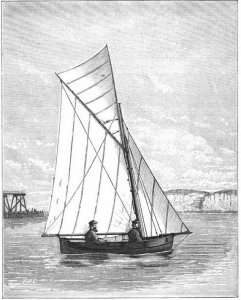He Also Had A Hammer.
 From: Kevin DuBrow, CEO, DuBrow Grains
From: Kevin DuBrow, CEO, DuBrow Grains
To: All Staff
Subject: Company Morale.
Hello Everyone,
Word has gotten back to me that most of you are unhappy with my decision to fire James Alger, better known to everyone in the company as Jimmy. Well let me be perfectly clear about something: I liked Jimmy too. He’d been with us a very long time and from what I heard was always a good employee. Stories about his practical jokes got back to me. I’m glad he played a part in cheering people up even though I had to speak to him about not doing it on company time. There’s nothing wrong with a little fun. I know that better than anyone. I’m the one who hung up that poster of the cat hanging from the tree in the breakroom, the one that I then had to take down after someone wrote a bad word on it. But let’s make sure we focus on work when we’re working, people.
That brings me to my main point: the reason I fired Jimmy. His actions were bad enough but what really disturbs me is how the rest of you also acted. As you know we had a two and a half ton shipment of corn that Jimmy, for some reason, decided to run through the auxiliary mill. Now first of all every one of you knows the auxiliary mill is exclusively for wheat and millet, not corn. We have never used the auxiliary mill for corn and Jimmy’s decision resulted in extensive and costly cleanup. The corn was supposed to be delivered to the customer whole, since it was popcorn, and I’ve had to try and find a new buyer. If I can the corn will still be sold for a lower price. That will be reflected in everyone’s paychecks for the next quarter.
I’m really sorry about that but Jimmy used the mill when I wasn’t here, and I feel like everyone bears some responsibility. Nobody acted to stop Jimmy or tell him not to move that shipment of corn. No one stopped him from operating the mill by himself. Do I have to spell this out? Jimmy cracked corn and no one cared because I was away.
Everyone, we need to pull together for the success of this company. Please remember what my grandfather, who founded this company, used to say: There is no I in cooperation. We used to have a banner that said that in the breakroom, although I had to take it down when someone wrote a bad word on it. Maybe I should get another one made but banners are expensive. That’s why we only have one every year on my birthday.
I hope you will all reflect on this and I hope I can trust you. Don’t forget that my door is always open when I’m not in a call or really busy and I am always here if you need help or want to talk. Except next week when I’ll be at a conference in Duluth.
Thank you, and let’s all pull together to do a better job.
Kevin DuBrow, CEO, DuBrow Grains
P.S. Casual Fridays are cancelled until further notice.


 I used to listen to BBC Radio 4 at my desk at work. Sometimes it got too distracting and I had to turn it off, but I always made time for—and would sometimes schedule my day around—the show Just A Minute. It’s a hilarious show in which four panelists are given subjects to talk about for a full minute without hesitation, repetition, or deviation. And from the very first episode
I used to listen to BBC Radio 4 at my desk at work. Sometimes it got too distracting and I had to turn it off, but I always made time for—and would sometimes schedule my day around—the show Just A Minute. It’s a hilarious show in which four panelists are given subjects to talk about for a full minute without hesitation, repetition, or deviation. And from the very first episode 







